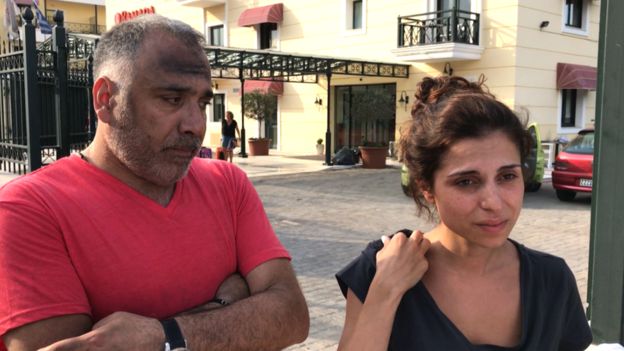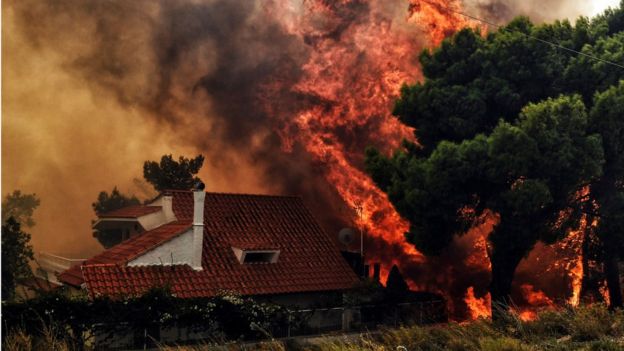Driving into the coastal resort of Mati, the village most severely affected by the wildfires, the regional welcome sign that had advertised what was once one of Greece’s picture-postcard tourist villages, was hanging down by the side of the road, charred and unreadable.
Mati has been strangely split by the inexplicable path the wildfires made as they raged through the town. There are hotels, homes and apartments scorched and destroyed on one side of the road, but on the other, many buildings are completely untouched.
The luckier residents peer out through unscathed windows, having narrowly escaped the fate of their neighbours.
People have been walking around wearing medical facemasks, to protect from the stench and the smoke, as they work out what to do.
Some have returned to their homes to check for pets and belongings, despite the government’s safety advice to keep away in case their building collapses.
It’s a small village. The main village hub, the Cavos bar, has been destroyed. Most people I speak to know someone who has died or been badly injured.

Katerina Pantelidis was watching the local news on Monday evening and says the report about wildfires spreading suggested that the wind direction meant Mati would avoid the flames. But, she says, minutes later she smelt burning and looked outside to see the pine trees on fire, and heard her windows smash.
She picked up her two cats, and attempted to pick up her dog, but had to leave him when he ran into a smoke-filled part of the house. She ran with her parents to the beach, along with hundreds of others escaping the flames and smoke. Her house was destroyed.
Many swam into the sea, but Katerina remained on shore with her cats and elderly parents, breathing through their clothes and waiting five hours for the coastguard. Incredibly, the dog survived – Katerina later found him hiding in a back room underneath a broken window.
At the nearby Ramada hotel, staff had to evacuate hundreds of tourists, and although the building escaped the inferno, people are being advised not to stay here. Suitcases line the reception and forecourt as holidaymakers work out where to go, while staff and locals face the fact that their main source of income, tourism, will now be affected.
Tonight there’s still no electricity, many roads are closed off and it is pitch black on the streets apart from the flashing lights of police cars and fire engines as they continue to survey the damage and try to prevent any secondary fires breaking out.
Dozens of Greek families who have been left homeless are gathering at the Marathon Beach Hotel, the makeshift relief centre, with volunteers bringing fresh food, water, clothes and comfort to those who have just lost everything.
Source: BBC


